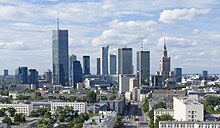The Business and Economics Portal Business is the practice of making one's living or making money by producing or buying and selling products (such as goods and services). It is also "any activity or enterprise entered into for profit." A business entity is not necessarily separate from the owner and the creditors can hold the owner liable for debts the business has acquired. The taxation system for businesses is different from that of the corporates. A business structure does not allow for corporate tax rates. The proprietor is personally taxed on all income from the business. A distinction is made in law and public offices between the term business and a company such as a corporation or cooperative. Colloquially, the terms are used interchangeably. (Full article...) Economics (/ˌɛkəˈnɒmɪks, ˌiːkə-/) is a social science that studies the production, distribution, and consumption of goods and services. Economics focuses on the behaviour and interactions of economic agents and how economies work. Microeconomics analyses what is viewed as basic elements in the economy, including individual agents and markets, their interactions, and the outcomes of interactions. Individual agents may include, for example, households, firms, buyers, and sellers. Macroeconomics analyses the economy as a system where production, distribution, consumption, savings, and investment expenditure interact, and factors affecting it: factors of production, such as labour, capital, land, and enterprise, inflation, economic growth, and public policies that have impact on these elements. (Full article...) Selected articleThe General Theory of Employment, Interest and Money was written by the British economist John Maynard Keynes. Although The General Theory was written in the aftermath of the Great Depression and was taken by many to justify the assumption by government of the responsibility for the achievement and maintenance of full employment, it is for the most part a highly abstract work of theory and by no means a tract on policy. Its full meaning and significance continues to be debated even today. As a book, it is a difficult read for a modern student of economics, although it is enlivened by some brilliant rhetorical passages, including the description of the stock market in Chapter 12 and the concluding chapter 24 on the (rather tentative) policy implications Keynes derived from his theory. Selected image
Selected economyThe economy of Poland is an industrialised, mixed economy with a developed market that serves as the sixth-largest in the European Union by nominal GDP and fifth-largest by GDP (PPP). Poland boasts the extensive public services characteristic of most developed economies. Since 1988, Poland has pursued a policy of economic liberalisation but retained an advanced public welfare system. This includes universal free public healthcare and education (including tertiary), extensive provisions of free public childcare, and parental leave. The country is considered by many to be a successful post-communist state. It is classified as a high-income economy by the World Bank, ranking 20th worldwide in terms of GDP (PPP), 21st in terms of GDP (nominal), and 21st in the 2023 Economic Complexity Index. Among OECD nations, Poland has a highly efficient and strong social security system; social expenditure stood at roughly 22.7% of GDP. The largest component of Poland's economy is the service sector (62.3%), followed by industry (34.2%) and agriculture (3.5%). Following the economic reform of 1989, Poland's external debt has increased from $42.2 billion in 1989 to $365.2 billion in 2014. Poland shipped US$224.6 billion worth of goods around the globe in 2017, while exports increased to US$221.4 billion. The country's top export goods include machinery, electronic equipment, vehicles, furniture, and plastics. Poland was the only economy in the EU to avoid a recession through the 2007–08 economic downturn. (Full article...) Selected quote"The value an economizing individual attributes to a good is equal to the importance of the particular satisfaction that depends on his command of the good. There is no necessary and direct connection between the value of a good and whether, or in what quantities, labor and other goods of higher order were applied to its production. A non-economic good (a quantity of timber in a virgin forest, for example) does not attain value for men if large quantities of labor or other economic goods were applied to its production. Whether a diamond was found accidentally or was obtained from a diamond pit with the employment of a thousand days of labor is completely irrelevant for its value. In general, no one in practical life asks for the history of the origin of a good in estimating its value, but considers solely the services that the good will render him and which he would have to forgo if he did not have it at his command. Goods on which much labor has been expended often have no value, while others, on which little or no labor was expended, have a very high value. Goods on which much labor was expended and others on which little or no labor was expended are often of equal value to economizing men. The quantities of labor or of other means of production applied to its production cannot, therefore, be the determining factor in the value of a good. Comparison of the value of a good with the value of the means of production employed in its production does, of course, show whether and to what extent its production, an act of past human activity, was appropriate or economic. But the quantities of goods employed in the production of a good have neither a necessary nor a directly determining influence on its value."
TopicsRelated WikiProjectsDid you know (auto-generated) -
On this day in business history
General imagesThe following are images from various business-related articles on Wikipedia.
More did you know
Business news Wikinews Economy and business portal
|
How Can We Help?









































Recent Comments